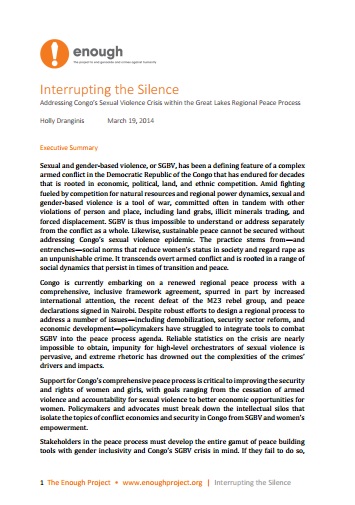
Executive Summary
Sexual and gender-based violence, or SGBV, has been a defining feature of a complex armed conflict in the Democratic Republic of the Congo that has endured for decades that is rooted in economic, political, land, and ethnic competition. Amid fighting fueled by competition for natural resources and regional power dynamics, sexual and gender-based violence is a tool of war, committed often in tandem with other violations of person and place, including land grabs, illicit minerals trading, and forced displacement. SGBV is thus impossible to understand or address separately from the conflict as a whole. Likewise, sustainable peace cannot be secured without addressing Congo’s sexual violence epidemic. The practice stems from—and entrenches—social norms that reduce women’s status in society and regard rape as an unpunishable crime. It transcends overt armed conflict and is rooted in a range of social dynamics that persist in times of transition and peace.
Congo is currently embarking on a renewed regional peace process with a comprehensive, inclusive framework agreement, spurred in part by increased international attention, the recent defeat of the M23 rebel group, and peace declarations signed in Nairobi. Despite robust efforts to design a regional process to address a number of issues—including demobilization, security sector reform, and economic development—policymakers have struggled to integrate tools to combat SGBV into the peace process agenda. Reliable statistics on the crisis are nearly impossible to obtain, impunity for high-level orchestrators of sexual violence is pervasive, and extreme rhetoric has drowned out the complexities of the crimes’ drivers and impacts.
Support for Congo’s comprehensive peace process is critical to improving the security and rights of women and girls, with goals ranging from the cessation of armed violence and accountability for sexual violence to better economic opportunities for women. Policymakers and advocates must break down the intellectual silos that isolate the topics of conflict economics and security in Congo from SGBV and women’s empowerment.
Stakeholders in the peace process must develop the entire gamut of peace building tools with gender inclusivity and Congo’s SGBV crisis in mind. If they fail to do so, sexual and gender-based violence will become a lasting vestige of Congo’s armed conflict, undermining the development of a truly peaceful post-conflict society as it has in too many post-conflict societies, including Sierra Leone, South Africa, and Guatemala.
This policy paper sets Congo’s sexual violence crisis within the context of the conflict, clarifying the links between sexual violence and the economic and political drivers of the war. It also aims to show how policymakers can integrate tools to end sexual violence into the peace process to end the use of sexual violence as a weapon of war and mitigate its destructive legacies as Congo embarks on its path to peace.
Click here to continue reading the full report.

